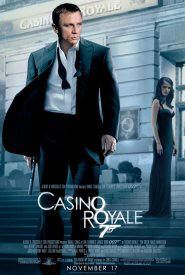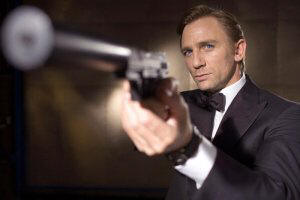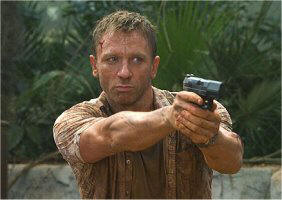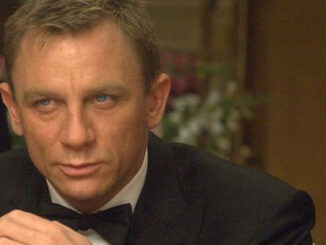 In the past, the advertising for the soon-to-be-released latest installment in the James Bond series would trumpet loudly, “Bond is back!” But with the release of Casino Royale and the assumption of Daniel Craig into the role of the famous British spy, the franchise has taken the opportunity to reset things and give us an adventure showing the forces that molded Bond into their top agent during his early days with the British Secret Service. Bond isn’t back so much as arriving and he certainly knows how to make an entrance.
In the past, the advertising for the soon-to-be-released latest installment in the James Bond series would trumpet loudly, “Bond is back!” But with the release of Casino Royale and the assumption of Daniel Craig into the role of the famous British spy, the franchise has taken the opportunity to reset things and give us an adventure showing the forces that molded Bond into their top agent during his early days with the British Secret Service. Bond isn’t back so much as arriving and he certainly knows how to make an entrance.
The movie wastes absolutely no time in plunging audience into the action with its pre-title sequence showing Bond making the two kills he needs to make to qualify for his “Double 0” status. As we see Bond kill the contact of a government official selling secrets, it is a brutal affair, bone crunching and raw, signaling to the audience that this in store for a much more realistic Bond film than has been seen in recent years. Other real world elements creep into the story as it unfolds. Bond is on the trail of a terrorist financing network headed by a man named Le Chiffre who uses the funds entrusted to him to make a personal fortune by playing the stock market with the foreknowledge of when a terrorist attack will occur. However, after Bond foils a plot to bomb the unveiling of a new jumbo jet liner, Le Chiffre finds he has lost $100 million that he had invested in the stock market hoping to turn a profit by selling short just before the attack. In order to make up the amount before his terrorist client kills him, Le Chiffre goes to Montenegro to compete in a high-stakes poker game. Bond is assigned to enter the game and stop Le Chiffre from winning. If he succeeds, Le Chiffre will be undoubtedly be killed the terrorist for whom he was laundering money and his financing network will be destroyed. But if Bond loses, a potential $150 million dollars will go to finance international terrorism.
 Becoming the sixth actor to take over the franchise’s lead role, Craig makes a stunning debut, breaking the mold that previous Bonds were cast in. His Bond is more brutish and thuggish than suave and sophisticated, rough hewn and prone to brash, impulsive behavior. He has trouble keeping his emotions in check and that sometimes affects his judgment. He is clearly misogynistic, preferring to bed married women as he sees them as “disposable pleasures.” He is a hard, brutal Bond for a hard, brutal world.
Becoming the sixth actor to take over the franchise’s lead role, Craig makes a stunning debut, breaking the mold that previous Bonds were cast in. His Bond is more brutish and thuggish than suave and sophisticated, rough hewn and prone to brash, impulsive behavior. He has trouble keeping his emotions in check and that sometimes affects his judgment. He is clearly misogynistic, preferring to bed married women as he sees them as “disposable pleasures.” He is a hard, brutal Bond for a hard, brutal world.
As the only returning series actor, Dame Judy Dench manages to bring a new dynamic to her interactions with Craig’s Bond as his boss M than she did with previous Bond actor Pierce Brosnan. Whereas before she played the head of Britain’s intelligence community as a woman who needs to be tougher than the men whom she commands, Dench plays M slightly softer and more tolerant and forgiving of Bond’s brash actions. She is also allowed a moment of reflection at the end of the film, concerned perhaps about the price Bond has had to pay as a result of going on the mission she ordered him to take.
Bond girls have long been a staple of the franchise, a bit of cinematic eye candy for Bond to alternately bed and rescue from the villains clutches. Here, though is the first time since 1969’s On Her Majesty’s Secret Service that a Bond girl services more than just the movie’s formulaic needs. Eva Green’s Vesper Lynd, the Treasury agent assigned to oversee the $10 million entrusted to Bond as a stake to gain entrance into the Casino Royale poker game, is smart and sensual, but still vulnerable enough to be affected by the brutality of Bond’s world. It’s easy to see why Bond would fall in love with her and why he is devastated by the action within the third act of the movie.
 Bond films are at their best when they mix real world scenarios with a dash of high adventure. In updating author Ian Fleming’s nearly 50 year old novel, the screenwriters have had to update a few details to account for changes in global politics since the Cold War. The Soviet spy bureau SMERSH has been changed to the terrorist organization that Le Chiffre finds himself working for. The novel’s original exotic card game of Baccarat has been changed to the more familiar Texas Hold `Em poker. In fact this the only place where the script seems to stumble, as it finds it necessary to have one of Bond’s associates provide a running commentary to Vesper on the game as a means of explaining the action.
Bond films are at their best when they mix real world scenarios with a dash of high adventure. In updating author Ian Fleming’s nearly 50 year old novel, the screenwriters have had to update a few details to account for changes in global politics since the Cold War. The Soviet spy bureau SMERSH has been changed to the terrorist organization that Le Chiffre finds himself working for. The novel’s original exotic card game of Baccarat has been changed to the more familiar Texas Hold `Em poker. In fact this the only place where the script seems to stumble, as it finds it necessary to have one of Bond’s associates provide a running commentary to Vesper on the game as a means of explaining the action.
Perhaps energized by the series’ restart, the production staff has brought their “A game” to the film. David Arnold’s score is lush and rich. He creates several nice new themes that compliment the film, especially considering that he only subtly hints at the traditional “007 Theme” until the final moments of the film, where its familiar strains signal the end of the transformation Bond undergoes over the course of the film. Cinematographer Phil Meheux’s work seems to conform to the demands of the scene, whether they be the grainy black and white photography of Bond’s first kill or the lush warm look of the Bahamas or the use of handheld cameras to bring the audience into close proximity of Bond’s hand-to-hand fights, revealing and perhaps reveling in their brutality. This craftsmanship elevates Casino Royale to a point where this is the first time in a long time that a Bond movie can be judged not just in relationship to other Bond movies but on its merits as a film itself.



